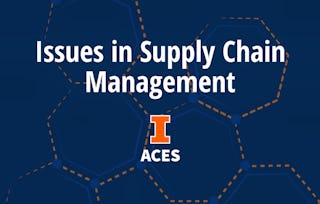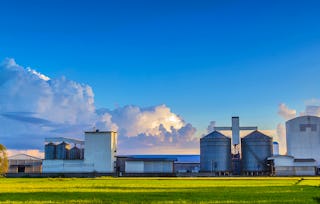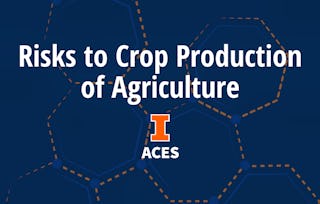Learners will be introduced to the production and distribution of agricultural commodities and food products. Topics will cover the full range of the agriculture supply chain, from pre-farm to the consumer, to provide students with a better understanding and appreciation for where and how crops and livestock are produced, and the systems used to distribute products to consumers. As a result of completing this course, learners will be able to describe the global nature of food chains from input supply to final consumer and explain the important drivers of demand for food products throughout the world.

Supply Chain of Agriculture
5 days left! Gain next-level skills with Coursera Plus for $199 (regularly $399). Save now.

Supply Chain of Agriculture
This course is part of Agribusiness and Sustainable Food Production Economics Specialization



Instructors: Paul B. Stoddard
5,944 already enrolled
Included with
(45 reviews)
Recommended experience
What you'll learn
Discuss the uses of agricultural land and describe the farm production cycles.
Explain the supply chain of agriculture from input supply to final consumer.
Examine the roles of consumer demand, economics, and technology on agriculture and the food supply chains.
Skills you'll gain
Details to know

Add to your LinkedIn profile
See how employees at top companies are mastering in-demand skills

Build your subject-matter expertise
- Learn new concepts from industry experts
- Gain a foundational understanding of a subject or tool
- Develop job-relevant skills with hands-on projects
- Earn a shareable career certificate

There are 4 modules in this course
In the course orientation, you will become familiar with the course, your classmates, and our learning environment. The orientation will also help you obtain the technical skills required for the course. In the second part of this module, you will describe the uses of agricultural land, and explain the varied ways agricultural producers use land to produce food and food products.
What's included
14 videos5 readings2 assignments1 discussion prompt
In this module, you will describe the agricultural supply chain, define agricultural commodities, and explain farm production cycles.
What's included
9 videos3 readings1 assignment
In this module, you will define agricultural inputs, describe the historical change of farm production inputs, examine the impact of precision agriculture and technology on global food production, and explain Cochrane's Treadmill Theory.
What's included
9 videos4 readings1 assignment
In this module, you will discuss the consolidation of the agricultural industry, explain soil and land productivity, examine the connection between productivity and food insecurity, and discuss environmental concerns of agriculture. At the conclusion of this module, you will be ready to complete the final assessment for the course and earn your Coursera certificate!
What's included
11 videos4 readings2 assignments
Earn a career certificate
Add this credential to your LinkedIn profile, resume, or CV. Share it on social media and in your performance review.
Instructors

Offered by
Explore more from Business Strategy
 Status: Free Trial
Status: Free TrialUniversity of Illinois Urbana-Champaign
 Status: Preview
Status: PreviewTechnical University of Munich (TUM)
 Status: Free Trial
Status: Free TrialUniversity of Illinois Urbana-Champaign
 Status: Free Trial
Status: Free TrialUniversity of Illinois Urbana-Champaign
Why people choose Coursera for their career

Felipe M.

Jennifer J.

Larry W.

Chaitanya A.
Learner reviews
- 5 stars
88.88%
- 4 stars
8.88%
- 3 stars
0%
- 2 stars
0%
- 1 star
2.22%
Showing 3 of 45
Reviewed on Apr 5, 2024
Very live and attractive presentation of all the modules. I'm very happy and want to say be blessed to all involved.
Reviewed on Jan 18, 2025
This was very insightful, I learned a lot and hope it will help me further my education in Agriculture and help me get back to the States on an H2A Visa.
Reviewed on Jul 26, 2025
very good course to understanding the supply chain of agriculture
Frequently asked questions
To access the course materials, assignments and to earn a Certificate, you will need to purchase the Certificate experience when you enroll in a course. You can try a Free Trial instead, or apply for Financial Aid. The course may offer 'Full Course, No Certificate' instead. This option lets you see all course materials, submit required assessments, and get a final grade. This also means that you will not be able to purchase a Certificate experience.
When you enroll in the course, you get access to all of the courses in the Specialization, and you earn a certificate when you complete the work. Your electronic Certificate will be added to your Accomplishments page - from there, you can print your Certificate or add it to your LinkedIn profile.
Yes. In select learning programs, you can apply for financial aid or a scholarship if you can’t afford the enrollment fee. If fin aid or scholarship is available for your learning program selection, you’ll find a link to apply on the description page.
More questions
Financial aid available,
¹ Some assignments in this course are AI-graded. For these assignments, your data will be used in accordance with Coursera's Privacy Notice.






